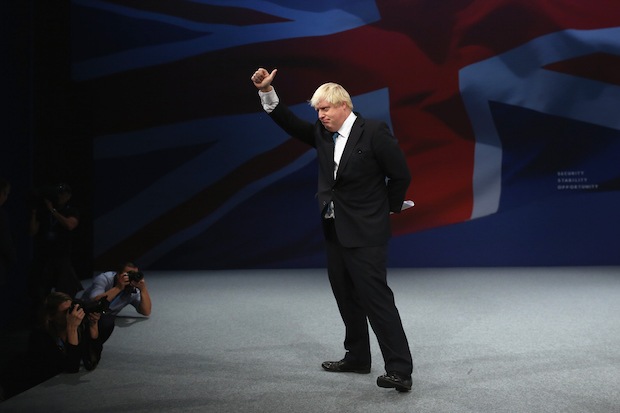The Tory conference this year is so stage-managed that not only did the party manage the no mean feat of sending out a check-against-delivery text of Boris Johnson’s speech before he stood up, but the Mayor then stuck to that text almost entirely. That text contained new jokes, rather than recycled ones, and was the better for it. He made quite clear that he wasn’t giving up on the leadership contest, and that a difficult first term doesn’t mean he’s not a serious option to lead the party in the future.
The reason Boris managed to show he was a serious option to lead the Conservative party was that he used those new jokes to show the appeal of Conservatism and the folly of the Left. He described the Corbynistas as ‘trots and militants with vested interests and indeed interesting vests’, and picked apart their ‘economic class war’ using jokes:
‘In the words of John McDonnell, an avowed Marxist who is seriously putting himself forward as the man to run the economy, fermenting – sic – the destruction of capitalism and I know there is a generation of young people who can’t remember communism and who think it might be a good idea to ferment anti-capitalism as if it were some fruity alcopop and so I say to all those £3 corbynistas – we tried that;
‘We tried fermenting anti-capitalism in the soviet union; we have tried brewing it in Britain in the 1970s and in many other parts of the world and the result has been the kind of toxic moonshine that sends you blind. Give that hooch a miss!
‘We don’t believe in destroying capitalism because for all its faults capitalism is the best means humanity has yet found of satisfying our wants and needs. We believe in using capitalism to deliver social and economic progress and we do it in a One Nation way – by bringing people together.’
The conference adored this, naturally. But they also adored Boris’s move to a more sober tone in which he articulated the challenges for Conservatism and talked about his policy achievements as London Mayor. He insisted that ‘we One Nation Tories cannot ignore the gulf in pay packets that yawns wider year by year’, describing the ‘sequoias’ who earn far more than the ‘shrublets’ below them. And he delivered a coded warning to George Osborne:
‘We must ensure that as we reform welfare and we cut taxes that we protect the hardest working and lowest paid, the retail staff, the cleaners, who get up in the small hours or work through the night because they have dreams for what their families can achieve, the people without whom the London economy would simply collapse.’
But Boris Johnson still lacked for not having a major government department: Osborne could look more serious yesterday simply by virtue of being able to announce major reforms to local government finance. His speech was clearly designed to appear more sober and more serious than in previous years, but he needs to be even more sober and more serious in coming years. He needs a major government brief, and though he wants to be the candidate who excites people about Conservatism, he also needs to give the impression that he could represent Britain at an EU Council meeting, for instance.
Mind you, he might not fancy pitching up to an EU Council meeting, if his red line on the EU renegotiation that he set out today is anything to go by. The Mayor said that ‘it should be up to this parliament and this country – not to Jean-Claude Juncker – to decide if too many people are coming here’, which is quite an ask from the renegotiation and confirms James’s reports in the past two issues of the Spectator that the Mayor is seriously considering Brexit as an option.
Boris has done enough today to show that he’s not just the conference jester. He still has to build up a support base in Parliament, and he still has to show he can run a department. But he has given the impression, which was surely his main aim, that he should be one of the main contenders in a leadership contest that looks as though it will boil down to whether Tory members think their party has better chance of winning big in 2020 with the safe man who’ll continue the Cameron project, or the exciting man who may encourage people to vote Conservative because they are inspired, and not just because they are worried.







Comments